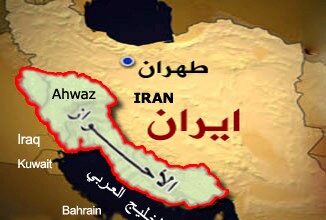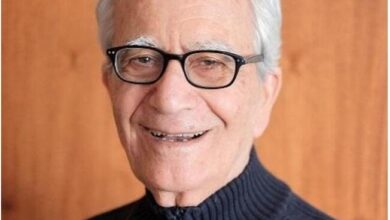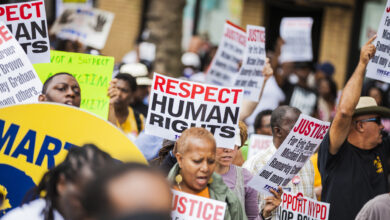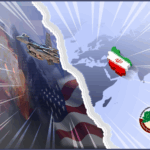Mistreatment of Palestinian Children in Israeli Prisons By Sheila MacGregor
By Sheila MacGregor

Mistreatment of Palestinian Children in Israeli Prisons
By Sheila MacGregor.
January 28, 2024
In 2014, Australian reporter John Lyons teamed with Four Corners and The Australian newspaper to conduct an investigation of Israeli prisons and the condition of the Palestinian children being detained in them. Four Corners was not allowed to film inside the prison during one of his visits to a facility near Jerusalehttps://fliphtml5.com/bookcase/dbsz?fbclid=IwAR3-WI71H2GyqqwOI5KnEu6FtkMKIageAcMEMPR8Sg6W5u-3vqF__MIdNAUm. Still, John’s reporting on the situation of the children being kept there is beyond disturbing. Lyons described what he saw in a short video clip online. In the clip, John is standing outside the prison walls, recounting what he saw.
He says, “I’ve been behind these walls three times; I saw children shuffle across the courtyard, handcuffed and shackled. Some hearings lasted 60 seconds. I saw one boy shout the name of his prison so his mother would know where he was being held. I saw the judge convict some children without looking at them. Through it all, what I saw was a conveyor belt of convicted children.”
Palestinian children are the only children in the world who are prosecuted in military courts. In a December issue of Time Magazine, a report was published stating that “An estimated 10,000 Palestinian children have been held in military detention over the past 20 years.” According to a report by Save the Children, 86 percent of children are beaten in detent
28on, 69 are strip-searched, and 42 percent are injured during the arrest. Many detentions result from throwing stones, a specific offense under Israeli military law.
Since 1967, the Palestinian children living in the occupied West Bank have been subject to Israeli military law, which allows that anyone from the age of 12 is under the purview of that law. This is contrary to International law, which sees anyone under 18 as a child.
Let your imagination take you for a minute to a Palestinian home in the West Bank, and your family is all tucked in for the night, sleeping uneasily, because all are aware of the constant presence of IDF soldiers that come into the refugee camps anytime without warning. Up until early morning hours, all is quiet, and then abruptly, the silence is disturbed by the rumble of military vehicles and soldiers banging on your door. Early morning, around 2 or 3 am, is the favorite time for the soldiers to storm through your house in search of your 12 or 13-year-old to detain them because they are accused of throwing stones at a settlement or slapping a soldier. Your child is dragged from their beds, handcuffed, and dragged by uniformed men to a military vehicle, where they undergo brutalization by the officers and then carried off to an Israeli prison.
These children are questioned without the presence of their parents, who, most of the time, cannot keep track of where they are being held due to being moved from one facility to the other without notice. If there is a reason for suspicion, any Israeli police officer or soldier may arrest any minor under administrative detention without a warrant. Secret evidence is used in administrative detention, which prevents the child and their attorney from knowing the truth and makes it more difficult for them to file a lawsuit challenging the detention and its alleged legal justifications.
On December 19th, 2017, Ahed Tamimi, at the age of 16, was detained by Israeli authorities for slapping a soldier. She was sentenced to eight months in prison after agreeing to a plea bargain and was released on July 29th, 2018. Just this past November 2023, she was detained in jail again for an Instagram post that her family says she did not write. Ahed was one of the prisoners released by Israel as part of the truce deal with Hamas.
After her release in 2018, she wrote a heartfelt letter to Vogue Arabia about her life during and after prison. She had this to say:
“I am a child of the Israeli occupation. It has always been there. My first real memory is of my father’s arrest in 2004 and visiting him in prison. At the time, I was three years old; he has since been arrested on two further occasions. Last year, when I was 16, I was arrested, too, during a nighttime raid for slapping a soldier who was standing in our yard. I was sentenced to eight months in an Israeli prison.
“Life behind bars was tough. The guards woke us at 5.30am for the count, and at 8am, they returned to search the cells. Our doors opened at 10.30am when we were let out for breakfast. Afterward, we would go to the other rooms, where I could talk to my fellow inmates. There were around 25 of us. We were not allowed outside and walked around in a big hall for exercise. Along with the other girls, I tried to make study groups, but the prison administration did not encourage this and broke up the class. Instead, we read books, and I passed my final exams in prison. Only my immediate family was allowed to visit me, and that was limited to 45 minutes through a glass barrier every two months.
“Through my arrest, I became the symbol of the occupation, but there are 300 other children in Israeli jails whose stories no one knows. Nurhan Awwad was arrested when she was 16 and sentenced to 13 years in prison. It is said that she tried to kill a soldier. Nurhan was walking with her cousin, who was shot and killed in front of her eyes. Israeli security forces also shot Nurhan, who was sent to hospital. From there, they took her to prison on a 13-year sentence. She is 18 today. The youngest girl in prison is Hadia Arainat. She is 16 and has already served three years; she should be released in four months. They say that she also tried to kill a soldier; she was on her way to school in Jericho at the time of her arrest.
“Since I was released on July 29, I have become a spokesperson for the Palestinian
cause, which is not easy. With this role comes a great deal of responsibility and pressure. In parallel, I am on a suspended sentence for the next five years; if I say something they don’t like, I can be imprisoned for another eight months. I must tread carefully. People often ask where I find my strength and courage to stand up to the occupation, but I am experiencing a situation that forces me to be strong. Of course, it is also due to the influence of my parents. They remain my biggest inspiration. Yet I believe everyone in my village is like me; I am not unique. Do I sometimes wish to let go and not be strong? No. Under occupation, you must be. I have constantly challenged my fear and found the strength I needed.
“If there was no occupation and Palestine was a normal country, I would move to Acre, live by the sea, and swim. I have only been once – even if the water is only 30km from my house. Some years ago, during
During Ramadan, Israel gave us permission to visit Jerusalem. On that day, my dad took us kids to the sea. We were afraid, of course, because it was illegal – the permit we had only allowed us to stay in Jerusalem for a few hours, but my father was determined.
“I want to be a regular 17-year-old. I like clothes, I like makeup. I get up in the morning, check my Instagram, have breakfast, and walk in the hills around the village.
Sometimes, I go to Ramallah with friends to go bowling, eat ice cream, and go to restaurants – but I am not a typical teenager. Both my parents have been in jail, as have I, and now my eldest brother, Waed, is imprisoned, too. I would play sports if permitted as a regular teenager living in a normal country. I wanted to become a football player but don’t play here because there is no time. Instead, I have been involved in demonstrations and confrontations with the Israeli army since I was a child. Many criticize that, but why not blame the military, which places itself in front of children? Under the occupation, everything is a crime. People should not accuse us; it is the occupation that is wrong. Everything we Palestinians do is a reaction against the occupation. I do not see any signs of improvement. On the contrary – the settlements will continue to expand, and there will be even more checkpoints; that is what I see three years from now in the West Bank. Yet, we still aspire that one day, we will live in free Palestinian thoughts. Two states will never come to pass. We believed that the Oslo Accords (signed in 1993 and 1995) would serve as a step to eventually achieve this – but look at the situation today.
“Now that I’ve completed high school, I want to study law, although I do not know where. I dream of working internationally five years from now, doing high-level advocacy for Palestine and speaking at the International Criminal Court in the Hague.
“I understand I have this role now, but I have no privacy. Sometimes, I feel like I am losing myself – my personality. People ask me what life was like in prison, but I wish I didn’t have to talk about it. I want to forget.”
(Vogue Arabia, October 2018)
There are so many children unjustly detained in the prison system of Israel, and there are too many to recount for this report. Many organizations have investigated and found Israel in violation of International and humanitarian laws. Many reports and papers have been written, and yet there are no changes for these children nor for the many adults who have been in prison for years.
What will it take to bring justice to Palestine and to its children? Nothing but a free Palestinian State where everyone is free and where democracy will give equal rights to all who are living in Palestine!





